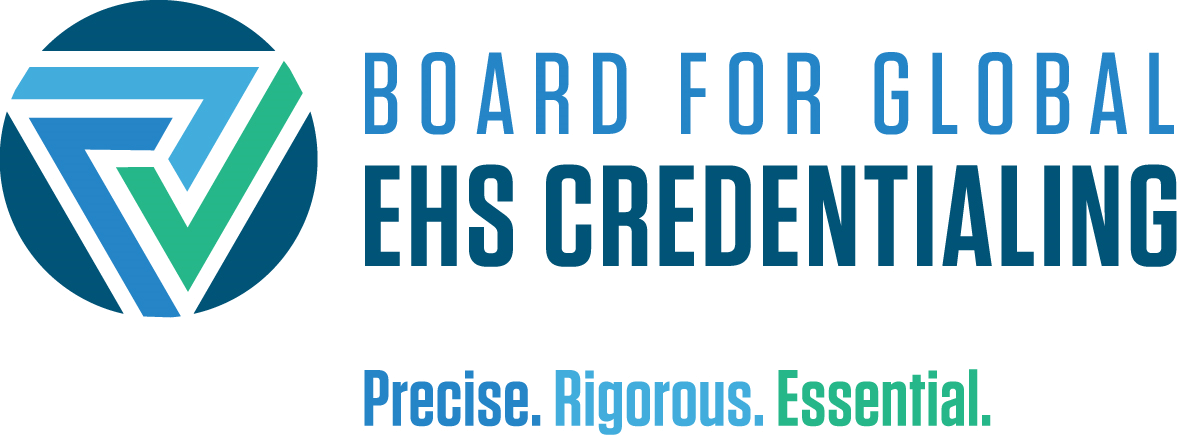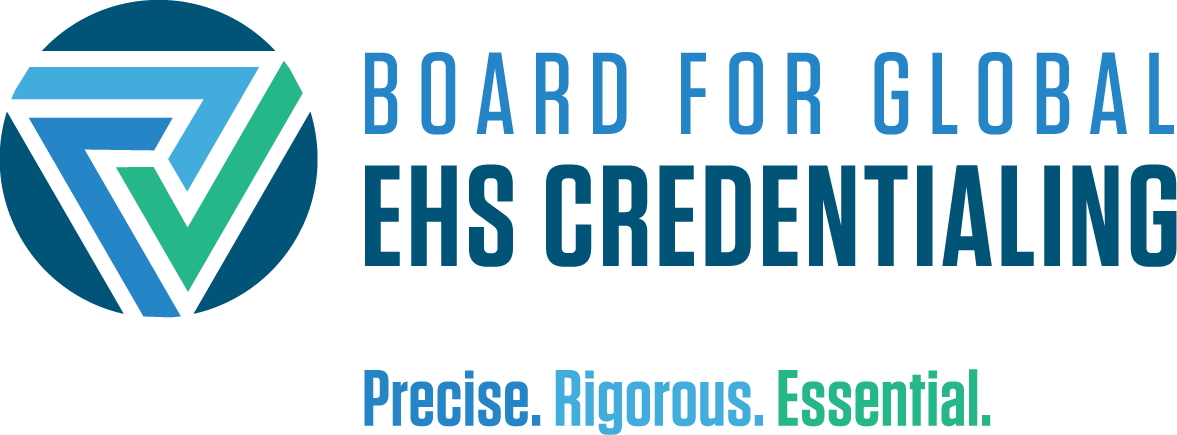CPSA Recertification Point Categories
CPSA Category 1 – Active Practice
| CM Cycle Credit | |||
| Minimum Required | Maximum Counted | ||
| None | 60 Hours | ||
|
If you are the
|
Then, for each 12 months of service, you can claim1 | ||
|
Up to 12 hours | ||
Description:
BGC does not ask that Diplomates keep precise work history records, but CM credit claimed in Category 1 should be consistent with the Diplomate’s work activities and job responsibilities.
One Credit hour for each hour spent on site will be awarded for participation in a quality assurance review (also known as a “peer” review). No Credit hours will be awarded for activities such as preparation time and writing the report.
A maximum of 60 hours may be awarded in the audit category per 5-year recertification cycle (12 hours per year) for:
- Participation as an audit team member.
- Management of an EHS auditing function.
Records:
Acceptable records include but are not limited to:
- Any documentation showing company logo or letterhead, bearing the Diplomate’s name and organizational title.
- Correspondence from the employer (past or current) attesting the Diplomate’s work history dates and job responsibilities in a company.
CPSA Category 2 – Technical or Professional Committee Service
| CM Cycle Credit | |||
| Minimum Required | Maximum Counted | ||
| None | 60 Hours | ||
|
If you are the
|
Then, for each 12 months of service, you can claim1 | ||
| Committee Chair or Member | 12 hours per position per year | ||
Description:
Recertification hours are awarded for technical or professional committee service outside of the Diplomate’s organization. BGC places no restrictions on how often the committee meets, how much time is invested, or how much progress is made. In general, if the work aligns with the CPSA Exam Blueprint/Body of Knowledge, it can be counted for credit.
Records:
Acceptable records include but are not limited to:
- Documents published by the Committee Sponsor or Society, showing the Committee roster for each year of claimed service
- Pertinent documents or correspondence which identifies you as a committee member, e.g., meeting agendas or minutes
If the Diplomate served on a committee but their name was not well documented, additional information will be needed, e.g., a letter from the committee chair or the member organization staff.
CPSA Category 3 – Publications
| |
CM Cycle Credit (Hours) | ||
| Minimum Required | Maximum Counted | ||
| None | 60 hours | ||
| Annual Credit (Hours) | |||
| If you publish … | Then Claim | Minimum Required | Maximum Counted |
| A book | 2 hours per single-spaced page up to 12 hours max per book | None | 12 hours per year |
| An article | 2 hours per single-spaced page up to 8 hours max per article | None | |
| A research paper | 2 hours per single-spaced page up to 8 hours max per paper | None | |
Description:
A maximum of 60 hours may be awarded in the publication’s category per 5-year recertification cycle (12 hours per year). Generally, one full journal page of single-spaced print is equal to 2 hours of recertification credit.
The information must be related to EHS Auditing. In general, if the publication aligns with the CPSA Exam Blueprint, it can be counted as EHS Auditing. Published articles or books not related directly to EHS auditing are acceptable if you are able to demonstrate that these activities contribute to your professional audit proficiency. Diplomates are advised to consult with BGC if there are any questions about their content.
Conference Proceedings do not receive Category 3 recertification hours due to their limited distribution.
EHS Auditing related chapters in books or similar publications as well as patents are treated as peer-reviewed articles.
Records:
Acceptable records include but are not limited to copies or links to the published material showing the publication, date, article title, and Diplomate’s name.
CPSA Category 4 – Attendance at Educational Programs
| CPSA CM Credit Hours for the Cycle | |||
| Minimum Required | Maximum Counted | ||
| None | 100 hours | ||
| If you attend … | Then Claim | Minimum Required | Maximum Counted |
| Ethics Courses | 0.5 points per hour | 2 hours | 6 hours |
| Other Courses | 5 points per meeting | None | 100 hours |
| Quizzes | 3 points per course | None | 12 hours per year |
Education Content Areas:
BGC does not prescribe or approve education courses. It allows practitioners to select the courses that best meet their needs. The overriding consideration in determining whether a specific program is acceptable is that it be a formal program of learning with the following characteristics:
- Contributes to the professional competence of participants
- States program objectives, which specify the level of knowledge the participants should have attained or the level of competence to be demonstrated upon completing the program
- Is developed by individuals qualified in the subject matter and instructional design
- Provides current, professional-level content that is relevant to the expected audience
EHS Auditing: The subject matter aligns with the CPSA Exam. Activities other than those listed in these guidelines may be deemed acceptable if the CPSA can demonstrate that they contribute to professional competence. Substantiating that a particular activity qualifies as acceptable and meets the requirements is the responsibility of the CPSA.
Examples of Acceptable General Topics (Provided that They Meet Recertification Criteria):
- Audit Program Design and Management
- Audit Procedures, Processes, and Techniques
- Internal Controls
- Regulatory Aspects
- Process Operations, EHS Impacts, and Related Pollution Control
- EHS Specific Regulatory Knowledge
- EHS Auditing Standards and Practices
- EHS Science and Technology
- Technical and Environmental Aspects of Facility Operations
- Relevant Requirements of EHS Laws, Regulations, Related Documents
- EHS Management Systems Standards and Guidelines
General Management/Leadership: General management training, including Leadership, addresses skill development, which is generically applicable to many professionals, not just EHS auditing professionals, e.g., communication techniques, technical writing, presentation techniques, organizational effectiveness, media training, computer skills, supervisory skills, quality training, financial or accounting training, expert witness training, project management. (If the general management training has significant EHS aspects in the content, it can still be claimed in the EHS auditing area of Category 4.)
Ethics (Required): The subject matter aligns with the BGC Code of Ethics. A minimum of 2 and a maximum of 6 hours may be awarded in the education category per 5-year recertification cycle. There is flexibility in fulfilling this requirement. Ethics courses can cover a variety of topics within the broader concept of ethics, such as conflicts of interest, transparency, ethical leadership, fairness, honesty, truthfulness, integrity, accuracy, objectivity, confidentiality, compliance, legality, conflict management, undue influence, equal opportunity, diversity, intellectual property rights/plagiarism, use of certification marks, and professional competency/limitations (i.e., when to refer a client). Acceptable courses also may include topics not listed as long as they directly relate to the BGC’s Code of Ethics.
Examples of Acceptable Ethics Courses:
- The BGC Code of Ethics (or any component of the BGC Code of Ethics)
- Developing codes of ethics for the organization (not in the internal audit activity)
- How to resolve ethical dilemmas
- Ethical cultures
- Ethics helplines or hotlines
- The role of ethics in corporate governance
- Organizational ethics programs
- Organizational ethics maturity models
- How to audit organizational ethics programs
- Collaborating with ethics officers
- Personal Ethical Choices, Behaviors, and Decision Making
- Ethical Choices as required by Organizational Codes of Ethics and Business Conduct
- Ethics focused on Enhancing Stakeholder Confidence and Value
- Ethical Practice improving the organization’s contributions to the public at large
- Ethics and Standards of Conduct for Auditors
- Ethical behaviors resulting from professional interactions in the audit process
Examples of Courses Not Fulfilling the Ethics Requirement:
- Classes focused on specific compliance obligations
- Security laws and insider trading regulations
- Medical claims submission requirements
Credit-Hour Calculations:
Recertification Areas & Point Values: A Technical Contact Hour is the time spent in technical sessions. Technical contact hours include technical presentations, lectures, breakouts, Q&A, exams, event overview, event recaps, and discussions. It does not include the non-technical activities, e.g., meals, breaks, exhibitor time, networking, participant introductions, social tours, generic welcome speeches, and award presentations.
Diplomates can claim CM credit for an EHS auditing, ethics or management educational event that is targeted to the professional (not technician) level and advances the person’s technical knowledge and skills. EHS auditing and management training must be at least one hour; ethics training can be any length. An in-person education session from 50 to 60 minutes in length can be claimed for 1 hour of technical content.
- Courses: The same course may be claimed only one time per CM cycle because the technical content typically does not change significantly. An initial training course and a refresher training course are counted as two different courses. The same course can be repeated and claimed in a later CM cycle. Use the technical contact hours as provided by the Sponsor. Note that 1 CEU = 10 technical contact hours.
- Conferences: Conferences can be claimed for each attendance because it is assumed that the technical content changes for each conference. You may claim 3 hours for each half-day of attendance OR track and report the hours based on actual attendance in the technical sessions. Note that claiming the maximum time usually means that you attended every possible technical session and did not participate in any non-technical activity, e.g., breaks, meals, networking, Vendor visits, awards, social, etc.
- Internal Company Training: Internal Company training qualifies for CM credit if it is a designated topic on the meeting agenda and meets the specifications of item #1 above. Many internal company training topics do not qualify for CM credit in Category 4 because the Diplomate already receives CM credit in Category 1 Active Practice, e.g., leadership messages, goal reviews, strategy sessions, problem-solving sessions, area updates. These must be designated activities with proof of participation meeting the same records requirements as other items in Category 4 (date, time, length, subject, or title clearly defined, proof of attendance, the signature of a person in responsible charge, etc.).
- Academic Coursework: CM hours can be awarded for credit and non-credit college or university courses. Fifteen (15) CM hours of recertification credit are awarded for each semester hour of college/university credit earned; ten (10) CM hours of Recertification credit are awarded for each quarter-hour of college/university credit earned.
- Graduate Degrees: CM credit for a doctoral degree in IH or an IH-related field can be claimed in one of two ways: 1) you can claim credit for individual courses if they meet the specifications of item #1, above, or 2) you can make a one-time claim of 10 CM points (60 hours) when your degree is confirmed. You must choose only one method; you cannot use both. Academic courses in a master’s degree program can be claimed if they meet the specifications of item #1 above. However, a one-time CM credit option is not available for conferral of the degree or master’s thesis.
- Distance Learning: Distance learning events (e.g., virtual seminars/courses/conferences, correspondence courses, home study, etc.) and physical presence events are treated the same for purposes of CM credit calculations.
If the education provider does not provide the contact hours, the Diplomate will need to calculate the time from an agenda or schedule. Contact time can be:
- Exact, e.g., 75 minutes = 1.25 hours
- Estimated, using the average hours per half-day, e.g., 2.5 hrs./half day X 6 half days = 15 hrs.
- Rounded down but not up, e.g., 95 minutes = 1.5 hours
If an event has technical content in more than one CM Area, the Diplomate may:
- Use the one CM Area that is >50% of the technical content, or
- Use each of the CM Areas, assigning the time accordingly
EX: An 8-hour Professional Development Conference (PDC) is 75% EHS Auditing and 25% ethics. This could be claimed as either:
- 8 EHS Auditing hours, or
- 6 EHS Auditing hours and 2 Ethics hours
Records:
An acceptable record is one that shows the following:
- Diplomate’s name
- Event title
- Date of completion
- Event Sponsor/Provider
- Duration (e.g., hours or CEUs)
If any of this information is missing or if the subject matter is not clear from the title, then additional records will be needed, e.g., event description, agenda, or schedule.
If the event Sponsor or Provider does generate a participation record, then any one of the following will be acceptable:
- Certificate, letter/email, transcript, roster, or other Sponsor-generated record showing completion
- Registration receipt if purchased on-site, at a single-day event
- Event badge only if issued on-site, at a single-day event
If the event Sponsor or Provider does not generate a participation record and there are no other restrictions for use, participation, or viewing from the Sponsor, Provider, or Content Owner then the Diplomate may use one of the following:
- Registration record and evidence of physical presence in the city on the day(s) of the event, e.g., approved expense report, purchase receipts
- Attendance Roster
- BGC Attendance Verification Form
- CPSA vouching (allowed once per CM cycle)
Academic Transcripts are required as evidence of graduate education. The education must take place within an accredited college or university. Applicants with international degrees may be required to submit their transcript(s) for a credential evaluation unless the academic program is authorized by BGC or through a BGC-recognized accreditation agency to issue BGC verification statements. (Note: BGC verification statements streamline and shorten the review for applicants. Please contact your program director to find out if verification statements are available for you.)
Unacceptable Records:
- Advance Travel Purchases
- Event Agenda, Programs, Conference Schedule, or presentation slides
- BGC Letter of Award (for CM points)
- Event badges if distributed prior to the event
- Airline boarding passes are acceptable for the days of travel but are not sufficient for a multi-day conference
CPSA Category 5 – Teaching or Presenting
| CM Cycle Credit | |||
| Minimum Required | Maximum Counted | ||
| None | 60 Hours | ||
|
If you teach
|
Then, you can claim1 | ||
| A course for the first time | Presentation Time PLUS the Presentation time multiplied by 3 | ||
| A repeat of a course | Presentation Time to a maximum of 6 hours per year for the course | ||
Description:
The subject matter must be EHS Auditing or related content, which means that it aligns to the CPEA Exam Teaching or presenting must be outside of the Diplomate’s organization and primary job responsibilities. For example, an Academic Teacher could not claim Category 5 CM credit when teaching at their university, but they could claim credit when teaching an external professional development session at a National Conference (because it is outside their primary organization and job description).
Diplomates whose primary job is as a Consultant is bound to the same rules. In general, Consultants usually may claim CM credit for any Conference presentation; however, teaching can typically only be claimed if it:
- Is not part of the range of services offered by the consultancy, or
- Is part of the range of offered services but was offered without compensation.
Sales, advertising, and marketing presentations soliciting the audience to purchase the Consultant’s products or services are not eligible for Category 5 CM credit.
Diplomates should also avoid double-dipping, i.e., claiming recertification hours when both presenting (Category 5) and participating (Category 4) at the same event. As a rule of thumb, the Diplomate may claim both Category 4 and 5 recertification hours if the teaching/presenting time is < 15% of the total participation time (e.g., 1-hour teaching during a 6-hour class).
- The hours reported for the first presentation will be based on the presentation time, plus credit for preparation time equivalent to three times the presentation time.
- Subsequent presentations of the same material may be reported as presentation time only, up to a maximum of 6 credit hours per year.
Records:
Acceptable records include but are not limited to:
- Evidence in the form of an agenda, schedule, or proceedings showing name, topics, dates, and times
- Sponsor acknowledgment indicating length and topic of the presentation
CPSA Category 7 – Other Approved Activities
| Practice | Claim | Maximum Credit Counted |
| Pro Bono activities | 1 hour for each our of qualifying participation | 60 Hours |
Description:Credit will be awarded for EHS Auditing volunteer activities (not for pay or part of regular job duties) within, or for, an organization possessing an environmental, health, safety focus, e.g., homeland security, emergency response, public safety, public health mission, disaster sites, local emergency training, or Science Fairs. Credits are awarded for activities which specifically involve the development or significant improvement of the beneficiary organization’s abilities to audit or assess the effectiveness of its program(s). For example, for participation in a community or regional public health emergency preparedness drill, credit would be awarded for the development or improvement of methods to assess the effectiveness of the various components of the emergency drill and identify prioritized opportunities for improvement or for the implementation of such systems. Records:Documentation of the volunteer activity should be obtained in the form of a letter or other written correspondence from the supervisor or director of the volunteer organization or activity, to be maintained by the applicant for re-certification. |
||
| Submitting acceptable CPSA Exam questions | 2 hours per question | 12 hours per year |
Description:CPSAs may submit questions to be included on future CPSA examinations. Question writers should follow best practices for developing certification exam questions and must include source references. 2 hours will be awarded for each question accepted by BGC. A maximum of 12 hours may be awarded in the question writing category each year period for a total of 60 hours for each 5-year recertification cycle. Records:Documentation of credits is submitted by the Chair of the Examination Committee or BGC Examination Director. |
||
| Other Professional Certifications | 6 hours per certification | 6 hours per year |
Description:New (first-time) certification in an area related to an EHS auditing field occurring after attainment of the CPSA. These include the CIA, CPA, CSP, CIH, CHMM, CRSP, and QEP credentials. Each certification passed in a year is awarded 6 hours, which is counted only once when the certification is initially awarded. Eligibility Criteria
Records:Acceptable records include but are not limited to documentation of certification from the credentialing organization. |
||
CPSA CM Handbook






